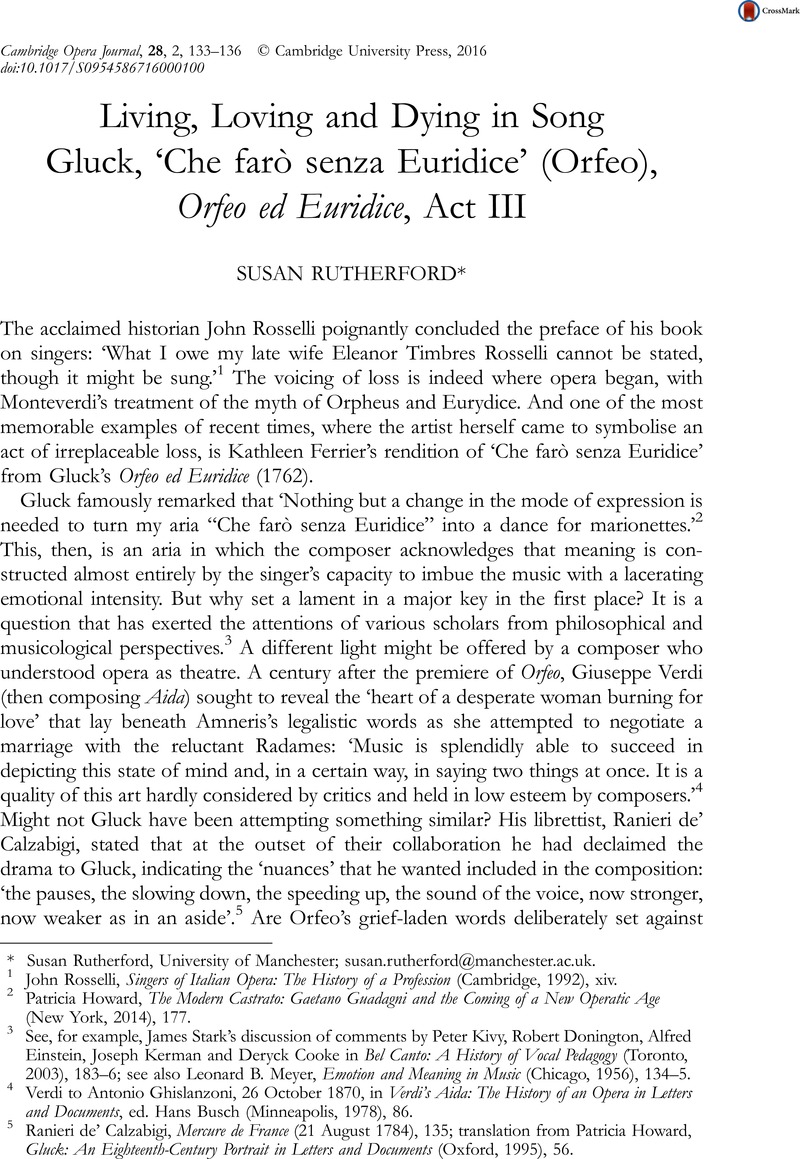No CrossRef data available.
Article contents
Living, Loving and Dying in Song Gluck, ‘Che farò senza Euridice’ (Orfeo), Orfeo ed Euridice, Act III
Published online by Cambridge University Press: 28 September 2016
Abstract

- Type
- Research Article
- Information
- Cambridge Opera Journal , Volume 28 , Special Issue 2: Special Issue: Remaking the Aria , July 2016 , pp. 133 - 136
- Copyright
- © Cambridge University Press 2016
Footnotes
Susan Rutherford, University of Manchester; susan.rutherford@manchester.ac.uk.
References
1 Rosselli, John, Singers of Italian Opera: The History of a Profession (Cambridge, 1992), xiv Google Scholar.
2 Howard, Patricia, The Modern Castrato: Gaetano Guadagni and the Coming of a New Operatic Age (New York, 2014), 177 CrossRefGoogle Scholar.
3 See, for example, James Stark’s discussion of comments by Kivy, Peter, Donington, Robert, Einstein, Alfred, Kerman, Joseph and Cooke, Deryck in Bel Canto: A History of Vocal Pedagogy (Toronto, 2003), 183–186 Google Scholar; see also Meyer, Leonard B., Emotion and Meaning in Music (Chicago, 1956), 134–135 Google Scholar.
4 Verdi to Antonio Ghislanzoni, 26 October 1870, in Verdi’s Aida: The History of an Opera in Letters and Documents, ed. Hans Busch (Minneapolis, 1978), 86.
5 Calzabigi, Ranieri de’, Mercure de France (21 August 1784), 135 Google Scholar; translation from Howard, Patricia, Gluck: An Eighteenth-Century Portrait in Letters and Documents (Oxford, 1995), 56 Google Scholar.
6 In 1777 Gluck wrote ‘I have persuaded myself that song, when it thoroughly takes the colour of the feeling it is to express, should be as various and as many-sided as feeling itself; in fine, that the voices, the instruments, the tones, even the pauses, should strive after one end – expression – and the agreement between words and the song should be such that neither the poem should seem made for the music nor the music for the poem.’ Hedwig and von Asow, E.H. Mueller, eds., The Collected Correspondence and Papers of Christoph Willibald Gluck, trans. Stewart Thomson (London, 1962), 99 Google Scholar.
7 Calzabigi claimed that ‘Orfeo went well because we discovered Guadagni, for whom it seemed tailor-made; it would have fared disastrously in other hands’; in Howard, The Modern Castrato, 108.
8 Stark, Bel Canto, 186.
9 For a full discography, see Campion, Paul, Ferrier: A Career Recorded (London, 1992)Google Scholar.
10 Ferrier, Winifred, The Life of Kathleen Ferrier (London, 1971), 46 Google Scholar.
11 Parker, Roger, Leonora’s Last Act: Essays in Verdian Discourse (Princeton, 1997), 168 Google Scholar.
12 Parker, Leonora’s Last Act, 169–70. The production (3 and 6 February) was conducted by Sir John Barbirolli and directed by Frederick Ashton.
13 Ferrier died on 8 October 1953, aged only forty-one.
14 The producer was Carl Ebert. Stiedry had been Mahler’s assistant at the Vienna Court Opera in 1907.
15 In a BBC radio broadcast in 1948, Ferrier described the difficulties she faced (having only ever previously played Bottom in A Midsummer Night’s Dream in a school play) with acting in The Rape of Lucretia. Ferrier, The Life of Kathleen Ferrier, 69–70.
16 Ferrier to her father and sister, May 1947; in Letters and Diaries of Kathleen Ferrier, ed. Christopher Fifield (Woodbridge, 2003), 9.
17 Taubman, Howard, ‘Records: “Orfeo”: Concise Version of Gluck Opera with Miss Ferrier in Title Role’, The New York Times (8 February 1948), 10 Google Scholar.
18 Ferrier, 12 July 1949, in Letters, 87.
19 Ferrier, 11 January 1951, in Letters, 138.
20 Ferrier to Bruno Walter, 8 July 1951, Letters, 154. A day later she again describes it as ‘a pretty awful production’ to Emmie Tillett: Letters, 155.
21 This recording is thought to have been for an Italian radio broadcast on 6 February; see Campion, Ferrier, 72–3.
22 Walter, Bruno, ‘Farewell’, in Kathleen Ferrier: A Memoir, ed. Neville Cardus (London, 1954), 275 Google Scholar.
23 The Covent Garden production was given in English translation.




